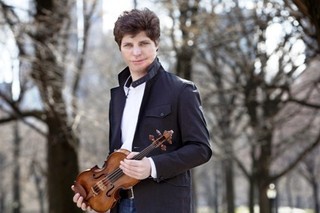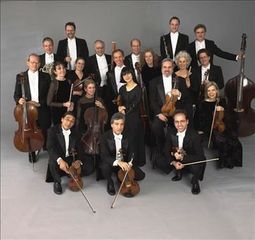|
Back
Cuckoos and Kisses New York
Isaac Stern Auditorium, Carnegie Hall
12/05/2015 -
Georg Frederic Handel: Concerto Grosso, Opus 6, No. 5
Igor Stravinsky: Divertimento from Le Baiser de la Fée (arranged for violin and orchestra by Dmitry Sitkovetsky)
Peter Ilych Tchaikovsky: Valse-Scherzo, Opus 34
Ottorino Respighi: Gli Uccelli
Augustin Hadelich (Violin)
Orpheus Chamber Orchestra

A. Hadelich (© Courtesy of the Artist)
Civic-minded citizens at the Orpheus Chamber Orchestra concert last night could learn a vital lesson about recycling our most valuable resources.
Begin with some minor piano/vocal works by Tchaikovsky and re-cycle them into a ballet by Igor Stravinsky with a recycled story by Hans Christian Anderson, The Fairy’s Kiss. Now recycle that ballet into a concert suite called Divertimento. And recycle that once more into a concert piece for violin and piano.
Enough? Probably. Until last night. That most inventive Azerbajnian-born conductor-violinist Dmitry Sitkovetsky decided, with a commission by the Orpheus Orchestra, to minimally re-orchestra the concert suite, add the violinist, and we had the premiere of this new Fairy’s Kiss last night with a solo performance by that glorious young fiddler, Augustin Hadelich.
The result was totally unexpected–-and something which Stravinsky would have heartily approved. Not just for the royalties (which he voraciously recycled his other music) but because the “new” music fit the original like a pearl-encrusted frame would fit a Manet painting.
The Fairy’s Kiss is a Stravinsky enchantment, with nary the soupçon of the acerbic. It has Swiss dances (who knew the Swiss danced?), tender songs, a quirky ending, as lovely a piece as he ever composed. Now add the fact that, while Stravinsky’s instrument was the orchestra, Tchaikovsky’s favorite was the violin. So the duo was equally enchanting.
The orchestration remained basically the same (from listening without a score), though probably thinned out so Mr. Hadelich’s tones could radiate above the orchestra. Whether playing the same melody with a solo horn, or working with the whole ensemble, or playing on open strings and drone-like double-fingering for the rural dances, Mr. Hadelich transported the music into a glowing (if never over-ebullient) work of art.
Could the Orpheus Chamber Orchestra, with their extensive discography, make a recording of the piece? If so, I will be the first to purchase such an incandescent creation.
Mr. Hadelich was not finished with Tchaikovsky last evening. He and his Stradivarius performed a blatant showpiece, the Valse-Scherzo. If this was made to flaunt the soloist, Mr. Hadelich turned the showpiece into something gorgeous. His virtuosity is so apparent, the short (but unbelievably intricate) cadenza was tossed off with such élan that the showpiece became a pièce de résistance.

Orpheus Chamber Orchestra (© Ken Nahoum)
Still, this listener has always had reservations about the Orpheus Chamber Orchestra. Not the individual the mastery of these 30-odd players. But after more than four decades, their unique methods of fungible “core players” leading the ensemble takes a few minutes’ suspension of disbelief before settling into the music.
Nor did it help that the first two movements of the opening Handel Concerto grosso lacked ideal intonation. The convulsive opening march was a bit stodgy, the opening fugue opaque. Orpheus finally got into the right spirit with a whirling, almost Mendelssohnian scherzo. The Largo was moving–and the final minuet, more than a courtly convention, brought all the strings together in dance of impeccable articulation.
Since all the composers had recycled earlier works, Respighi’s The Birds dovetailed–literally into the proceedings. I have never understood why the Italian composer–with teaching by that master orchestrator Nicolai Rimsky-Korsakov–should be confined to his massive “Roman” pieces. For in transcribing old music, he has the delicacy of a Ravel, the lyricism and humor of a Poulenc.
Strangely, I had never heard The Birds played in a concert hall before. I had missed those inner voices (the first movement bassoon in stretto, the quacking, clucking concordance of chicken and hen sounds).
Yet this was not a Messiaen lesson in ornithology. Respighi gave us environment as well, and the final movement presented a “Cuckoo” which the Pastorale’s Beethoven would have envied. Not simply the sound of the bird (that common interval of a downward third), but the rustling of the forest, the echoes of the birds from different distances.
The Orpheus individual players, in this final movement, dedicated us here to a cosmos of ancient and breathless musical emotions.
Harry Rolnick
|